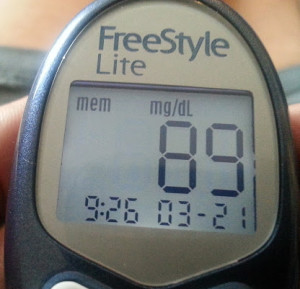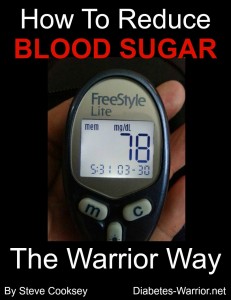How to manage diabetes? The formula below is simplified of course but those are the keys. Fact is, eating carbohydrates makes managing diabetes exponentially more difficult.
- Reduce carbohydrates from all sources
- Reduce inflammation from all sources
- Perform routine paleo-style exercises
- Take medications and insulin, only if needed
Diabetics with reduced pancreatic function will likely require insulin for the rest of their lives. However Type 2’s may wean off of diabetes drugs as long as they maintain truly normal blood sugar.

The key to living a long and fruitful life, diabetes complication free, is learning to manage diabetes properly. You properly manage diabetes by obtaining and maintaining truly normal blood sugars. My goal is 60-90 mg/dl fasting, and sub 100 all other times with the exception of very intense exercise.
Tool to Manage Diabetes
Any task is much easier if you have the right tool.
You can’t know if you have truly normal blood sugars unless you actually test your blood sugars. Common sense I know, but many diabetics only have their blood sugars tested by their doctor on yearly or periodic visits, this is a costly mistake. The costs can include organ failure, retinopathy, neuropathy and amputations.
Attempting to properly manage diabetes without testing your blood sugar is like driving a car at night without headlights. It’s a wreck waiting to happen.

You need to test with a quality blood sugar meter. In addition to the Freestyle Lite, I am also a fan of Walmart’s Micro Reli-On, in my testing it matched the Freedom Freestyle Lite in accuracy. The Micro is a very basic unit without the full features of the Freestyle Lite.
Managing Diabetes
How to manage diabetes? Obtain and maintain truly normal blood sugars. (I know I repeat this often, but it’s important)
How to reduce blood sugars into normal ranges?
Reduce Carbohydrates
Cut the CARBS, ONLY eat fatty meats, coconut oil, butter, eggs, leafy green vegetables and bone broth until your blood sugars are down into normal ranges.
I typically eat between 10-15g of Total Carbs. Here is a link to my ‘low carb paleo’ meal plan.
** I do NOT recommend that YOU eat any nuts nor fruits until you have normal blood sugars.
It really is simple, don’t over complicate it, Sometimes we complicate things so we can use it as an excuse, do not do it!
Reduce Inflammation
Inflammation can come from many sources including infection, injury, lack of sleep, stress, too much intense exercise, etc. All of these and more can be a source of inflammation and *can* raise blood sugars.
Exercise and Diabetes
I am a fan of exercise. There are many long term and short term benefits. I’ve written many posts on this topic, here’s one, “Diabetes And Exercise“. In short, if you have elevated blood sugars… go take a hike! Literally. Or a long walk. :)
I do not suggest performing very intense exercise if you have elevated blood sugars, why? Very intense exercise *can* raise and even spike blood sugars.
Reached a Blood Sugar Plateau?
I have experimented with “fat fasts” many times and in every instance my blood sugars dropped. In short, eat only fats such as Coconut Oil or butter.
IF you want to reduce blood sugars more quickly, it’s very simple, reduce the fuel for blood sugar spikes, carbohydrates. Yes many variables can influence blood sugar levels but carbohydrates is a variable you can control easily. Other variables including stress, sleep, exercise, etc.
A diet that is almost all fat will cause a drop in blood sugars, no doubt about it. (obviously Type 1’s and insulin dependent type 2’s have a more complicated formula)
HOWEVER … the alerts above concerning monitoring and adjusting drugs and insulin requirements are EVEN more important if you eat an ‘almost all fat’ diet.
I suggest doing alternating days. One day of 30g of total carbs or less, alternated with a day of true fat fasting.
Note 1: Keep in mind, as you eat lower carbs, you will need to adjust drugs and insulin requirements.
Note 2: I rant against a ‘drug first’ diabetes treatment plan … and rightly so in my opinion. However, proper blood sugar control is THE key. IF you need drugs or insulin to control your blood sugars… DO IT!
Lower Your Blood Sugar Naturally
If your blood sugars are elevated and you cannot achieve truly normal blood sugars with diet alone…
READ MY BOOK! How to Reduce Blood Sugars.

I’m not exactly on a paleo diet but I am now on a very low carb diet and it has a lot in common with what you recommend, perhaps with a little less purity, since I will have a Nathan’s hot dog sans bun or an egg that was not from a free-range chicken, or tuna from a can on occasion. (Gotta say, though, I get that grass fed beef when I can.) I started doing what I’m doing as a result of raging, out of control diabetes, where I was continually above the range of the meter despite copious amounts of insulin and Avandia. 4 1/2 months later, my bg readings are almost now always in either double digits or at least under 110. And the only diabetes medicine I haven’t stopped taking is metformin. Don’t know if I’ll ever get off of that one. I’m not too worried about it, it’s probably the least harmful one of the bunch. Oh, and I don’t need to take a statin any more either, for my cholesterol, which has improved. I’m still taking a blood pressure medication, though my blood pressure has improved now to the point where I’ll probably no longer need that.
But here’s the thing. The diabetes educators and nutritionists seem to be convinced that if I don’t have at least 110g of carbs per day, which they consider a “low carb” diet even though it’s probably closer to the number of carbs I have in a week, that somehow I will have some serious nutritional deficiencies, or will lack energy, or have some kidney problems, or something. And I’m not sure where they get these notions. And I think what they don’t get is that it’s not an either-or situation for me. If I eat that many carbs, I will need to take insulin and probably something like Actos again. And if I don’t, I won’t have to. Nutritionists don’t think about the other side of the risk-reward equation. By “depriving” myself of whatever little that carbs have to offer, I do not need to take medicines that I believe could harm me far more.
I think that the diabetes educators and the nutritionists are well meaning but ultimately they are offering advice that is wrong for me and in fact harmful. I think if this is true for me, it is probably true for others, but I can only speak for myself. It’s apparently not legal for me to pass on my advice to others. :)
Has there been anyone else in the entire state of North Carolina that has written a BOOK on their personal diet, with the intent that others will read it and glean information to apply to their own lives? A cookbook (which, by exhorting the readers to make the recipes, is essentially giving diet advice and/or changing the diet of those that read it)? A blog or web post?
Does no one in the entire state, whatsoever, write about cooking or food?
It seems unthinkable that no one else is sharing their personal journey with others in the ENTIRE state of NC.
I guess what I’m asking is: do every single one of the writer of the blogs on healthy living noted in the following link have a license to dispense advice on diet and fitness?
http://healthylivingblogs.com/location/united-states/north-carolina/
That seems highly unlikely. Which begs the question…why YOU? Why is YOUR blog the one they’re trying to shut down, and not these other blogs? Is it because they adhere to Conventional Wisdom and you don’t?
I remember when I used to live in America. I mean, I still reside here…but it’s not the same America, is it, when the rights guaranteed to us by the first ten amendments to the Constitution are constantly being trampled.
I can’t believe the ridiculousness of dieticians and nutritionists.
At diagnosis myself I was advised to eat at least 300g of carbohydrate a day on a 2,500 calorie a day diet… Was given the “Canada Food Guide” pamphlet and told the insane CDA (Canadian Diabetes Association) guidelines to keep Post-Prandial #’s under 180mg/dl (10.0mmol/L).
I’d already begun researching and testing, and told her if I ate that much carbohydrate, my blood sugar would be through the roof! She said if it stayed high, I’d likely need insulin and perhaps more medication. (Dumb answer, in my opinion.)
Instead I ate under 100g of carbohydrate a day on a 3,200 – 3,600 calorie a day diet, and about 150g a day when eating 5,000+ calories a day (long bike-riding days of 3 to 5 hours of intense riding).
I now eat about 2,800 calories a day and 45-60g of carbohydrate most days, all from non-starchy vegetables and the very-occasional piece of sprouted-grain bread. My typical fat intake is about 70% of my calories.
So here’s my results: Diagnosed January 4th, 2011 with Fasting of 267mg/dl (14.8mmol/L) and an HbA1c of 12.1%. I was around 320lbs, 48″+ waist, hypertensive (170/110) with horrible lipid profile. My own MD told me I should start on insulin and statins immediately, but I refused.
Today? Fasting BG’s typically under 100mg/dl (5.5mmol/L) with an HbA1c of 5.4%. My BP averages around 130/80 (I’ve always run high as a big guy), my lipids are great and I weigh 225lbs as a well-muscled mesomorph with a 35″ waist.
All this thanks to advice/blogs of people like you.
Howdy Steve, I’ve haven’t visited this website in a while. In fact I haven’t been on the internet in a long time. All I want to say is THANK YOU!! from the bottom of my heart…
… Rob, from the bottom of my heart… a sincerest and warmest .. THANK YOU! for the thanks sir.
Reading your comment is JUST what I needed this morning. :)
How does this work for a 63 year-old with a Pacemaker/defibrillator?
Right now I can only walk 100yards without stopping. I’m 6’3″ and #270.
Mose, my best advice to you is to see if you can find a paleo doctor on this site. http://paleophysiciansnetwork.com/ If not, contact the American Association of Bariatric Physicians and see if they have a referral in your area, I’ve heard they are ‘low carb’.
If you can’t find a low carb or paleo doctor… get back to me and I’ll see what I can do.
Thanks, Steve, there’s nothing within 50 miles so I think I’ll just read up on it and start slow.
Mose
Mose, indeed and of course…. keep an eye on those BGs … I weaned off drugs and insulin when my overnight fasting BG consistently went into the 80’s and 90’s.